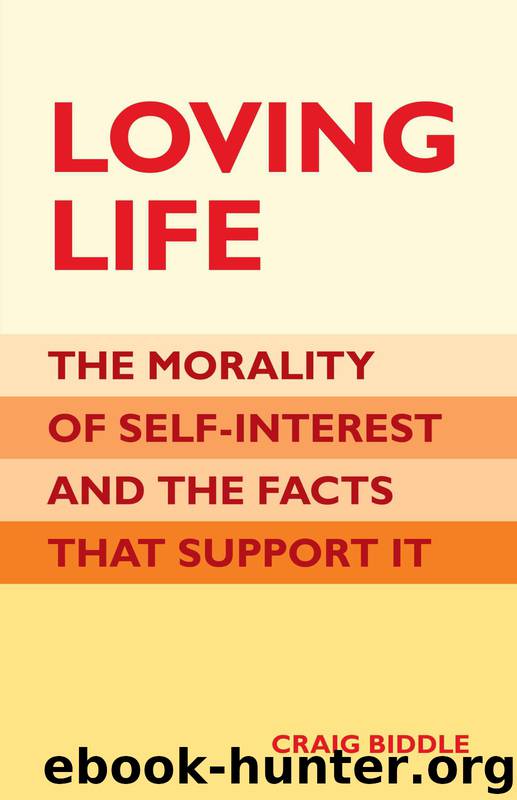Loving Life: The Morality of Self-Interest and the Facts that Support It by Craig Biddle

Author:Craig Biddle [Biddle, Craig]
Language: eng
Format: mobi
Publisher: Glen Allen Press
Published: 2001-12-31T14:00:00+00:00
It is obvious who profits and who loses by such a precept. It is not justice or equal treatment that you grant to men when you abstain equally from praising men’s virtues and from condemning men’s vices. When your impartial attitude declares, in effect, that neither the good nor the evil may expect anything from you—whom do you betray and whom do you encourage?16
There is only one kind of person who has anything to fear from moral judgment; the rest of us can only benefit from it. Being just consists in acknowledging this fact and acting accordingly, without exception, as a matter of principle. In any particular case, our means of judging people objectively is our own use of observation-based logic; and our standards for doing so are the life-promoting values, principles, and virtues we are discussing here.
Finally, it is important to emphasize that justice is not primarily about condemning and punishing the bad; it is primarily about recognizing and rewarding the good. Certainly, the bad should be damned and, when necessary, retaliated against as they deserve to be and as human life requires that they be. But first and foremost, the good should be praised and, when necessary, allied with as they deserve to be and as human life requires that they be. This order of precedence is crucial, because it is the good who make human life possible. They are the thinkers, the producers, the creators of life-promoting values; thus, the chief concern of justice is that they be treated accordingly.
Whether a person writes the Declaration of Independence or a brilliant novel, whether he develops life-saving drugs or time-saving software, whether he makes beautiful sculptures or perfect jump-shots, whether he discovers a cure for cancer or a solution to a crucial philosophic problem—if he selfishly creates rational values, he is morally good because of it. And we who wish to live as human beings owe such people not only our candid praise and moral allegiance, but also, when appropriate, our direct thanks.
While the virtue of justice is a matter of being rationally self-interested in regard to one’s relationships with other people, our next and final virtue, pride, is about being rationally self-interested in regard to one’s life in general.
Pride “is the commitment to achieve one’s own moral perfection.”17 As the hero of Ayn Rand’s novel Atlas Shrugged put it: “Pride is the sum of all virtues.”
Moral perfection is not infallibility, but an unwavering commitment to choose and pursue only selfish, life-serving values. It is not based on impossible or unachievable standards, such as “omniscience” (complete knowledge of everything) or “omnipotence” (the ability to do anything), but on the entirely possible and thoroughly achievable standard of choosing always to act on one’s best judgment. Moral perfection is not the absence of mistakes, but the presence of an uncompromising commitment to living rationally.
To be proud is to strive to achieve one’s highest potential in one’s character and life. It is to be fully and consistently self-interested. It is to seek
Download
This site does not store any files on its server. We only index and link to content provided by other sites. Please contact the content providers to delete copyright contents if any and email us, we'll remove relevant links or contents immediately.
| Anthropology | Archaeology |
| Philosophy | Politics & Government |
| Social Sciences | Sociology |
| Women's Studies |
The remains of the day by Kazuo Ishiguro(8975)
Tools of Titans by Timothy Ferriss(8365)
Giovanni's Room by James Baldwin(7326)
The Black Swan by Nassim Nicholas Taleb(7106)
Inner Engineering: A Yogi's Guide to Joy by Sadhguru(6785)
The Way of Zen by Alan W. Watts(6600)
Asking the Right Questions: A Guide to Critical Thinking by M. Neil Browne & Stuart M. Keeley(5759)
The Power of Now: A Guide to Spiritual Enlightenment by Eckhart Tolle(5752)
The Six Wives Of Henry VIII (WOMEN IN HISTORY) by Fraser Antonia(5497)
Astrophysics for People in a Hurry by Neil DeGrasse Tyson(5182)
Housekeeping by Marilynne Robinson(4436)
12 Rules for Life by Jordan B. Peterson(4299)
Double Down (Diary of a Wimpy Kid Book 11) by Jeff Kinney(4261)
Ikigai by Héctor García & Francesc Miralles(4246)
The Ethical Slut by Janet W. Hardy(4242)
Skin in the Game by Nassim Nicholas Taleb(4239)
The Art of Happiness by The Dalai Lama(4125)
Skin in the Game: Hidden Asymmetries in Daily Life by Nassim Nicholas Taleb(3989)
Walking by Henry David Thoreau(3953)
